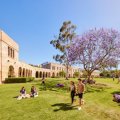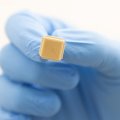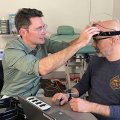
University of Queensland palaeontologist Dr Gilbert Price has been named the 2013 Queensland Tall Poppy of the Year.
The honour was announced at a ceremony in Brisbane on 21 November.
UQ’s Dr Simon Corrie, Dr Bradley Partridge, Dr Kate Schroder and Dr Irana Vetter were also among the 11 Queensland Tall Poppy Award winners, from disciplines spanning health and climate change research, materials science and mathematics.
The annual Australian Institute of Policy and Science Tall Poppy Awards recognise young scientists who combine world-class research with a passionate commitment to communicating science and who demonstrate great leadership potential.
Dr Price, from the UQ School of Earth Sciences, is trying to determine the timing and causes of extinction of Australia’s prehistoric giants, the ‘megafauna’.
This challenging scientific field is growing in relevance as the world is confronted by ongoing and increasing rates of extinction.
Dr Price said megafauna extinctions had puzzled scientists since the first fossils were discovered eroding from ancient deposits in the 1830s.
“If we can determine why animals like the megafauna became extinct, at a time of climate change and possibly human-driven environmental impacts, that information could be used to understand, identify and better evaluate the threats faced by modern populations,” he said.
Queensland Chief Scientist Professor Geoff Garrett and Queensland Science, Information Technology, Innovation and the Arts Minister Ian Walker presented the awards.
UQ Deputy Vice-Chancellor (Research) Professor Max Lu congratulated all of the Queensland Tall Poppy Award winners.
“The winners represent the young and brightest of the UQ research community,” he said.
“Their accolades from the Australian Institute of Policy and Science by these awards add to the reputation of UQ as a global top 100 institution.
“UQ’s global reputation will be further augmented by the recent announcement of the ARC grants, which saw UQ topping the nation in total amount of funding.”
Details of UQ’s Tall Poppies:
Australian Institute for Bioengineering and Nanotechnology chemical engineer Dr Simon Corrie is designing a skin patch that will change colour if certain proteins or antibodies are present in the blood or tissue lying just beneath the surface.
UQ Centre for Clinical Research Postdoctoral Research Fellow Dr Bradley Partridge is focusing on the use of ‘smart drugs’ said to be able to enhance intelligence, memory or attention spans.
By asking questions surrounding the regulation of these drugs, Dr Partridge hopes to find the best way to manage the promises and perils of using them.
Institute for Molecular Bioscience (IMB) researcher Dr Kate Schroder characterises the fundamental pathways used by the body to detect microbes and launch anti-microbial defence programs.
Kate’s research is helping us to understand exactly how the body fights infection and paves the way for the development of new anti-infective agents or vaccine formulations to combat infectious disease.
Dr Irina Vetter, also with IMB, uses toxins to improve understanding of pain mechanisms, aiming to develop more effective analgesics with fewer side-effects.
Media contact: Kate Bishop, UQ Communications, 3346 7887 or k.bishop3@uq.edu.au.
.jpg)











